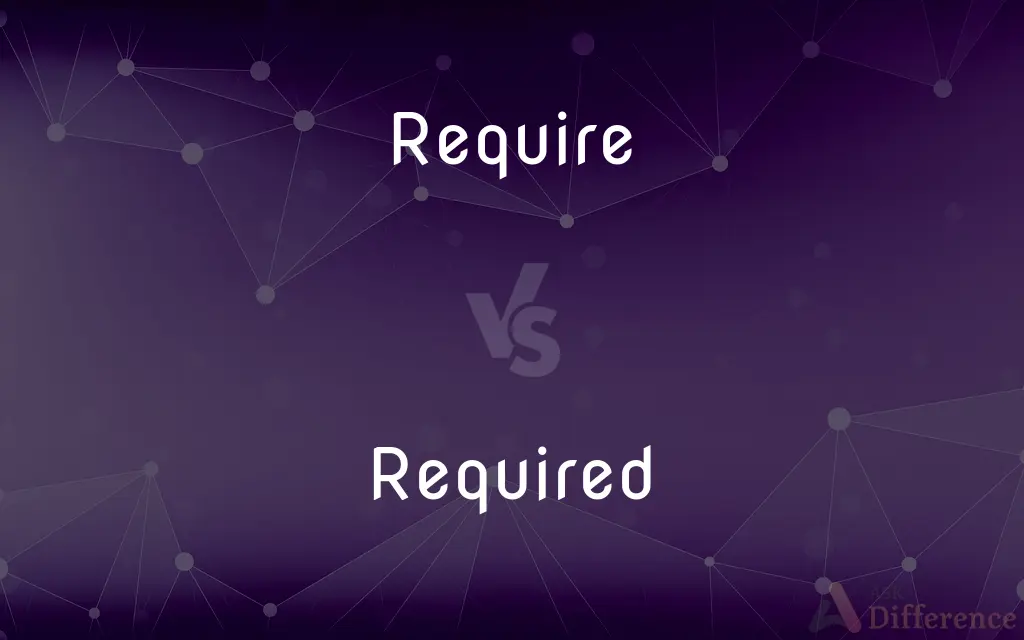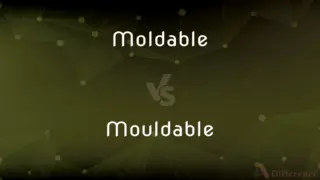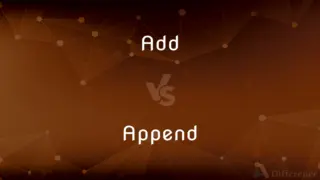Require vs. Required — What's the Difference?
By Maham Liaqat & Fiza Rafique — Updated on March 28, 2024
"Require" is a verb denoting the need for something, e.g., "This recipe requires salt," whereas "required" is its past tense, indicating a past need, e.g., "Salt was required for the recipe."

Difference Between Require and Required
Table of Contents
ADVERTISEMENT
Key Differences
"Require" expresses a current necessity or condition that must be met. For example, a job may require specific qualifications. On the other hand, "required" refers to a necessity or condition that was needed in the past. It suggests that the requirement was relevant to a situation or context that has already occurred or been completed.
While "require" is used to state ongoing or future needs in instructions, guidelines, or demands, "required" often appears in narratives or descriptions of past events to denote what was needed or obligatory at that time. This distinction highlights the importance of tense in conveying the timing of the necessity.
"Require" can also imply a demand or need for action in the present, emphasizing immediate or upcoming obligations. Conversely, "required" might suggest that the need or obligation has been fulfilled or is no longer applicable, reflecting a completed action or condition.
In legal or formal contexts, "require" can set forth current obligations or conditions that must be met, such as in laws, regulations, or contracts. Whereas "required" might be used in legal documents or historical accounts to reference obligations that were in place at a previous time.
When giving instructions or setting expectations, "require" is often used to clearly define what is necessary now or in the future, guiding behavior or actions. On the other hand, "required" can serve to evaluate or explain past actions, decisions, or policies, assessing compliance or fulfillment of past requirements.
ADVERTISEMENT
Comparison Chart
Tense
Present
Past
Usage Context
Indicates current or future necessity
Indicates past necessity
Implication
Suggests an ongoing or upcoming need
Suggests a need that has been met or is no longer current
Common in
Instructions, demands, guidelines
Narratives, historical accounts, past instructions
Example
"You require approval to proceed."
"Approval was required to proceed."
Compare with Definitions
Require
To make necessary.
The law requires that all drivers have insurance.
Required
Was asked as a condition.
Submission of documents was required to complete the process.
Require
To ask as a condition.
The application process requires submitting several documents.
Required
Needed or obligatory in the past.
A bachelor's degree was required for the job.
Require
To demand as a necessity.
This job requires attention to detail.
Required
Was necessary or demanded.
Reservations were required at the upscale restaurant.
Require
To impose a duty or obligation.
The contract requires that payments be made on time.
Required
Was made necessary by rules or laws.
Attendance was required at the meeting.
Require
To need for a particular purpose.
Modern recipes often require fresh ingredients.
Required
Was imposed as a duty or condition.
Timely payment was required under the agreement.
Require
To have as a requisite or necessity; need or depend on
Do you require assistance? Most plants require plenty of water.
Required
Needed; essential
Missing several required parts.
Require
To stipulate as obligatory by authority
The law requires full disclosure of charitable donations.
Required
Obligatory
Required reading.
Require
To demand as obligatory or appropriate
Skiing requires practice.
Required
Simple past tense and past participle of require
Require
To impose an obligation on; compel
The school requires all students to study mathematics.
Required
Necessary; obligatory; mandatory.
Require
(obsolete) To ask (someone) for something; to request.
Required
Necessary for relief or supply;
Provided them with all things needful
Require
To demand, to insist upon (having); to call for authoritatively.
Required
Required by rule;
In most schools physical education are compulsory
Attendance is mandatory
Required reading
Require
Naturally to demand (something) as indispensable; to need, to call for as necessary.
Require
To demand of (someone) to do something.
Require
To demand; to insist upon having; to claim as by right and authority; to exact; as, to require the surrender of property.
Shall I say to CæsarWhat you require of him?
By nature did what was by law required.
Require
To demand or exact as indispensable; to need.
Just gave what life required, and gave no more.
The two last [biographies] require to be particularly noticed.
Require
To ask as a favor; to request.
I was ashamed to require of the king a band of soldiers and horsemen to help us against the enemy in the way.
Require
Require as useful, just, or proper;
It takes nerve to do what she did
Success usually requires hard work
This job asks a lot of patience and skill
This position demands a lot of personal sacrifice
This dinner calls for a spectacular dessert
This intervention does not postulates a patient's consent
Require
Consider obligatory; request and expect;
We require our secretary to be on time
Aren't we asking too much of these children?
I expect my students to arrive in time for their lessons
Require
Make someone do something
Require
Have need of;
This piano wants the attention of a competent tuner
Common Curiosities
How do I use "require" in a sentence?
"Current regulations require all participants to wear helmets."
Can you give an example of "required" used in a sentence?
"At that time, regulations required all participants to wear helmets."
Is "required" only used in past tense?
Yes, "required" is the past tense form of "require," indicating past necessity.
What is the definition of "required"?
It refers to something that was needed or obligatory in the past.
How does the use of "require" affect the tone of instructions?
It makes instructions appear immediate and obligatory.
Can "require" suggest future necessity?
Yes, "require" can indicate both current and future necessities.
Can "require" and "required" be used interchangeably?
No, their use depends on the context of time (present for "require," past for "required").
Does "required" imply that the necessity no longer exists?
It implies that the necessity was in the past, but does not necessarily mean it no longer exists.
Why is tense important when using "require" and "required"?
Tense clarifies the timing of the necessity, indicating whether it is current or past.
What does "require" mean?
It means to need or demand something as essential.
What is the difference between "require" and "required" in legal documents?
"Require" states current obligations, while "required" refers to obligations that were in place in the past.
What are synonyms for "require"?
Need, demand, necessitate.
In what context would "require" be inappropriate to use for past events?
It would be inappropriate when referring to past necessities; "required" should be used instead.
What are synonyms for "required"?
Needed, obligatory, mandated.
How do "require" and "required" relate to obligations?
"Require" imposes current obligations, while "required" refers to past obligations.
Share Your Discovery

Previous Comparison
Moldable vs. Mouldable
Next Comparison
Add vs. AppendAuthor Spotlight
Written by
Maham LiaqatCo-written by
Fiza RafiqueFiza Rafique is a skilled content writer at AskDifference.com, where she meticulously refines and enhances written pieces. Drawing from her vast editorial expertise, Fiza ensures clarity, accuracy, and precision in every article. Passionate about language, she continually seeks to elevate the quality of content for readers worldwide.















































